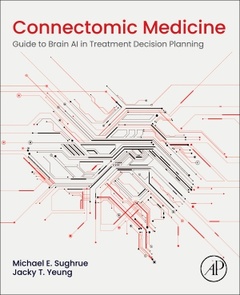Connectomic Medicine Guide to Brain AI in Treatment Decision Planning
Auteurs : Sughrue Michael E., Yeung Jacky T., Dadario Nicholas B.

Part 1: Foundations1. What is connectomic medicine and why should you upskill?2. Basic Concepts in Connectomic neuroimaging and modelling approaches3. Human brain network anatomy and function4. The Transdiagnostic model of Neuropsychological dysfunction5. Thinking about Neurocognitive functions as emergent phenomena6. Brain stimulation techniques and targeting principles7. Industrial grade Machine learning techniques for brain data analysis8. Novel ways to think about brain data
Part 2: Applications9. How to organize a Connectomics driven neuroscience clinic10. How to pick targets and brain stimulation approaches11. Connectomic approaches to neurosurgical planning12. Connectomic strategies for post-neurosurgical applications13. Connectomic strategies for stroke patients14. Connectomic strategies for depression and anxiety 15. Connectomic strategies for behavioral/psychiatric disorders 16. Connectomic strategies for movement disorders patients17. Connectomic strategies for dementia
Dr. Yeung is a fellowship-trained neurosurgeon who started his residency in neurosurgery at Yale University in 2013 after completing undergraduate studies at University of British Columbia in Honors Physiology, and his MD degree at Michigan State University College of Human Medicine. He is a member of the American Association of Neurological Surgeons. He obtained his fellowship training at the Centre for Minimally Invasive Neurosurgery in Sydney, Australia under Dr. Charles Teo. During that time, he published widely on the use of machine learning to study the human functional connectome and was the first neurosurgeon to publish on the use of personalized pre-operative brain mapping during intracerebral surgeries. He is currently a funded neurosurgeon-scientist, mentored by pioneer immunologist Dr. Lieping Chen, with an active research focus at Yale University on identifying novel immunotherapies for the treatment of brain cancers. He acts as the Chief Research Officer for Cingulum Health, which is the first clinic in the world to leverage personalized connectomics with transcranial magnetic stimulation to treat patients with wide-ranging neurological and psychiatric conditions.
Nicholas Dadario is an MD candidate at Rob
- Empowers readers to utilize clinically applicable AI platforms to enhance current neurological and psychiatric practices
- Provides understanding on how brain connectomics pertain to patients with brain-related ailments
- Serves as a guide towards maximally using existing connectomics software
- Details relevant clinical and radiological background
Date de parution : 12-2023
Ouvrage de 306 p.
19x23.3 cm



